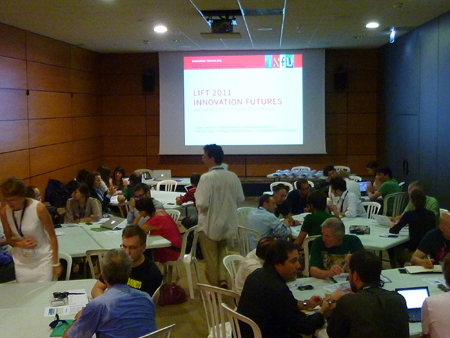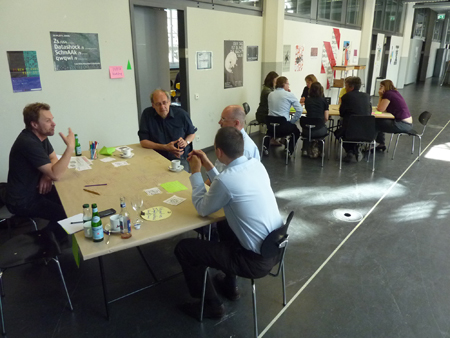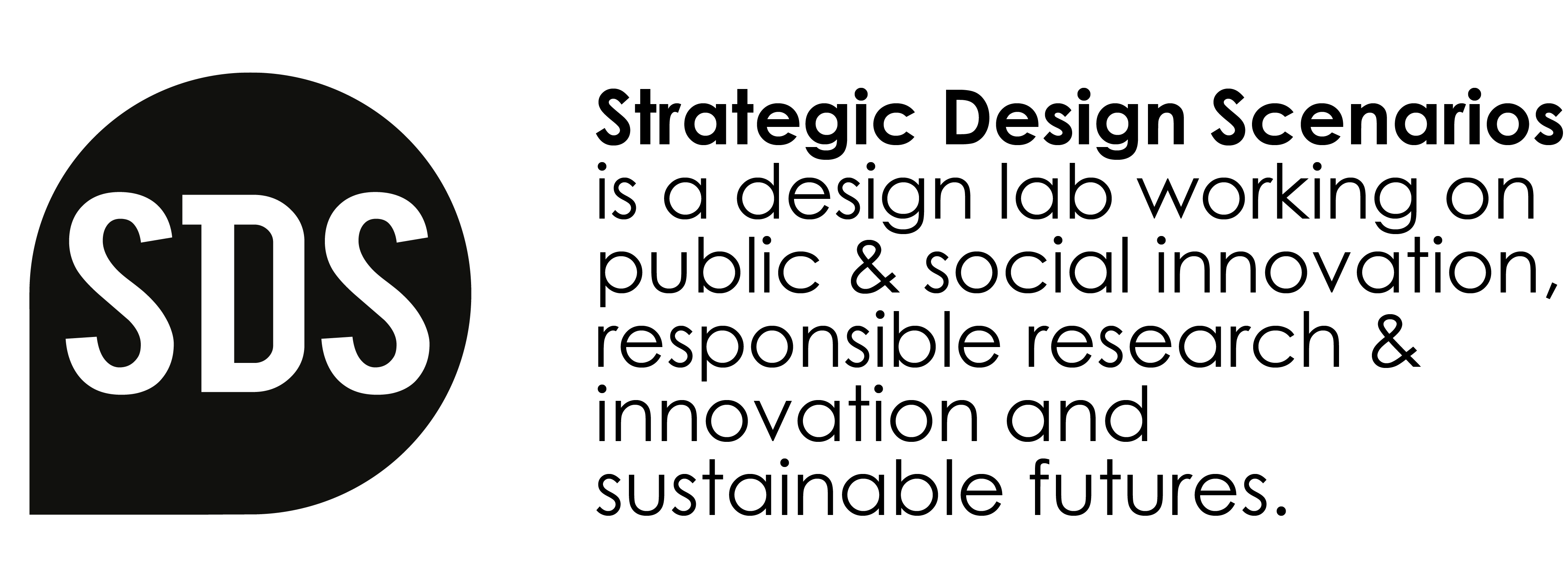
Innovation Futures workshop at LIFT 2011 –
Innovating within innovations challenges…
How is innovation changing and which challenges innovation will have to face in the coming future? INFU is an on-going European research project focusing futures of innovation, scanning weak signals of change in the current innovation landscape, extrapolating new patterns, discussing emerging visions, scenarios and implications for policy and practices.
Starting from this teasing material we proposed LIFT 2011 participants to join a board meeting of an Innovation Agency in 2036 as one of the workshop organised by within the famous conference programme in Marseille between the 6th and the 8th of July.
The Innovation Agency is specialized in how to innovate in innovation and was seeking for help to face the challenges that were just emerging 25 years ago in 2011 but that now are… burning!
The meaning of this workshop was to prompt strategic conversation about the possible consequences of todays’ and tomorrows’ innovation policies. The debate was triggered by a series of challenges based on extrapolating or exaggerating the trends observed through the INFU research project. The current motto is the consecration of the innovation society. What could be the externalities in terms of sustainability, employment, citizenship… if the booster of innovation reclaimed today will effectively happen?
LIFT conference is a good test bed for INFU: participants are all involved in a way or another in the development of innovation either as inventors or facilitators or even analysts of innovation processes. But they seem to be more focussed in detecting the emergence of a new phenomena than considering the diffusion or even the saturation of an innovation that is already known. The selection of weak signals scanned in the INFU research project and proposed as teasers to kick-off the workshop were already known and metabolised by most of the participants. Any form of ‘innovation camp’ for instance or the emergence of ‘co-working space’ seems to belong already to the past for Lifters whereas most companies and public institutions don’t even have experienced these forms of stimulation of innovation or haven even hardly heard of it…
 The challenges focused on maturity or saturation rather than launch trigger instead active debates. Participants aggregate in small groups around the topics they mostly fell challenged with and try to shape some solutions. We reproduce here the seven challenges and introduce the 5 minutes videos synthesizing each subgroup achievements:
The challenges focused on maturity or saturation rather than launch trigger instead active debates. Participants aggregate in small groups around the topics they mostly fell challenged with and try to shape some solutions. We reproduce here the seven challenges and introduce the 5 minutes videos synthesizing each subgroup achievements:
1_Challenge about rhythms in innovation:
Companies’ pressure on their employees to permanently innovate everyday of work provokes a range of suicides in companies. The Ministry of Labour and the Trade Unions would like the Innovation Agency to invent a new framework to regulate innovation expectations at work.
The group did not believe innovation pressure could be as dramatic as that but surprisingly the solution they propose starts from relieving this pressure, allocating more time to innovation, transparency in the management process but surprisingly, finished to build a scary control of innovation performances of employees integrated in human resources that let suppose that the challenge we wrote may become reality quicker than expected!
[vimeo]http://vimeo.com/26718258[/vimeo]
2_Challenge on eco-innovation:
Waste based innovation has take off in the 00’s and a complete new range of new products definitions and production processes based on reuse of existing components instead of rough materials. The world waste stock exchange market is working very well, even too well inducing a perverse increasing demand for waste materials. The Innovation Agency is asked to propose solutions to avoid this bias.
The group ends-up with results that seems also to acknowledge the proposed challenge: they indicate localisation of innovation and feedback processes to avoid global financial spin.
[vimeo]http://vimeo.com/26719150[/vimeo]
3_Challenge on users engagement in innovation:
Users have been more and more involved in innovations processes, included in users communities, trained to participation, enabled by do-it-yourself innovation kits… They have reached a level of autonomy in self-development of the solutions they benefit from. The global picture is more and more an atomization of micro-solutions, lack of interoperability, robustness, solidarity at macro-levels… European Commissions is pointing this problem in FP12 research calls to which the Innovation Agency is intending to respond…
The group diverged proposing 2 different solutions: the ‘catalyst’ that spread innovation, arbitrate between parties in a creative commons spirit against the ‘facilitator’, a regulator that don’t pretend to understand innovation and control processes but just try to remove locally the barriers…
[vimeo]http://vimeo.com/26718430[/vimeo]
4_Challenge on innovation stakeholder interaction:
In the last 2 decades the focus shift on the constant emergence of new players and new processes in innovation. Crowd sourcing facilities operating online worldwide, innovation camps between local stakeholders, spontaneous social innovation survey, distributed fabbing and production… challenge the former players of innovation. Research in public laboratories and universities, R&D of large corporations, open innovation platforms set by companies, design consultancies and classical innovation stakeholders appears less and less trendy, attract less talents and feel disconnected from the new players. The Innovation Agency is in charge of organizing a large conference in November 2037 to bring traditional and new innovation stakeholder together to debate and reconnect in a new innovation eco-system…
The subgroup advocate for the creation of a Shake-up platform promoting processes less focussed on owning the knowledge but by sharing, provoking, learning, catalyzing… is trying to get value out of the control of knowledge flows…
[vimeo]http://vimeo.com/26718437[/vimeo]
5_Challenge on public services innovation:
Dramatic shortage in public budgets in the 00’s pushed local authorities and national governments in putting the service burden on the shoulders of the citizens themselves. Shifts from public services to enable civic society, cities proposing open innovation platforms to involve their population, EU putting emphasis on social innovation as a new Eldorado… leads to some interesting developments but also many scary and insane experimentations to simply cover drastic budget cuts. After more than 2 decades now citizens demonstrate a clear participation fatigue reinforced also by the abuse of the collaborative consumption in the private sector. The Association of European Regions is commissioning the Innovation Agency to organize a symposium called: The Big New Deal between Big government and Big Society!
For the group, the public service is substituted by a Public Action Marketplace trading participation and personal contribution between citizens and a micro-local organisation of public services to generate a form of active welfare…
[vimeo]http://vimeo.com/26718573[/vimeo]
6_ Challenge on unsustainable externalities of innovation:
Innovation policies ever reinforced from the 00’s provoke an explosion of creativity and new products proposal are booming. The Council of Sustainable Development of the UN is urging the Innovation Agency to find a process to responsible innovation process and limit it to innovation supporting sustainability;
The group proposed the RIPA: Responsible Innovation Process Agency in charge at the same time to stimulate local communities to innovate but also to feedback to them the global impact consequences of their innovation…
[vimeo]http://vimeo.com/26718271[/vimeo]
7_Challenge on management of innovation:
Incentive in innovation during the last decades produced an exponential innovation process. EU Innovation Policy advocates it’s now time to promote active ‘recycling’ of innovation rather than stimulating new ones. The Innovation Agency is asked to develop a framework to facilitate this process;
Trash Reash proposed by the group is a super semantic search engine together with community based tagging that allow to scan innovations leftovers from technical innovation to managerial or social and cluster it as the basis of setting-up new companies..
[vimeo]http://vimeo.com/26719156[/vimeo]


